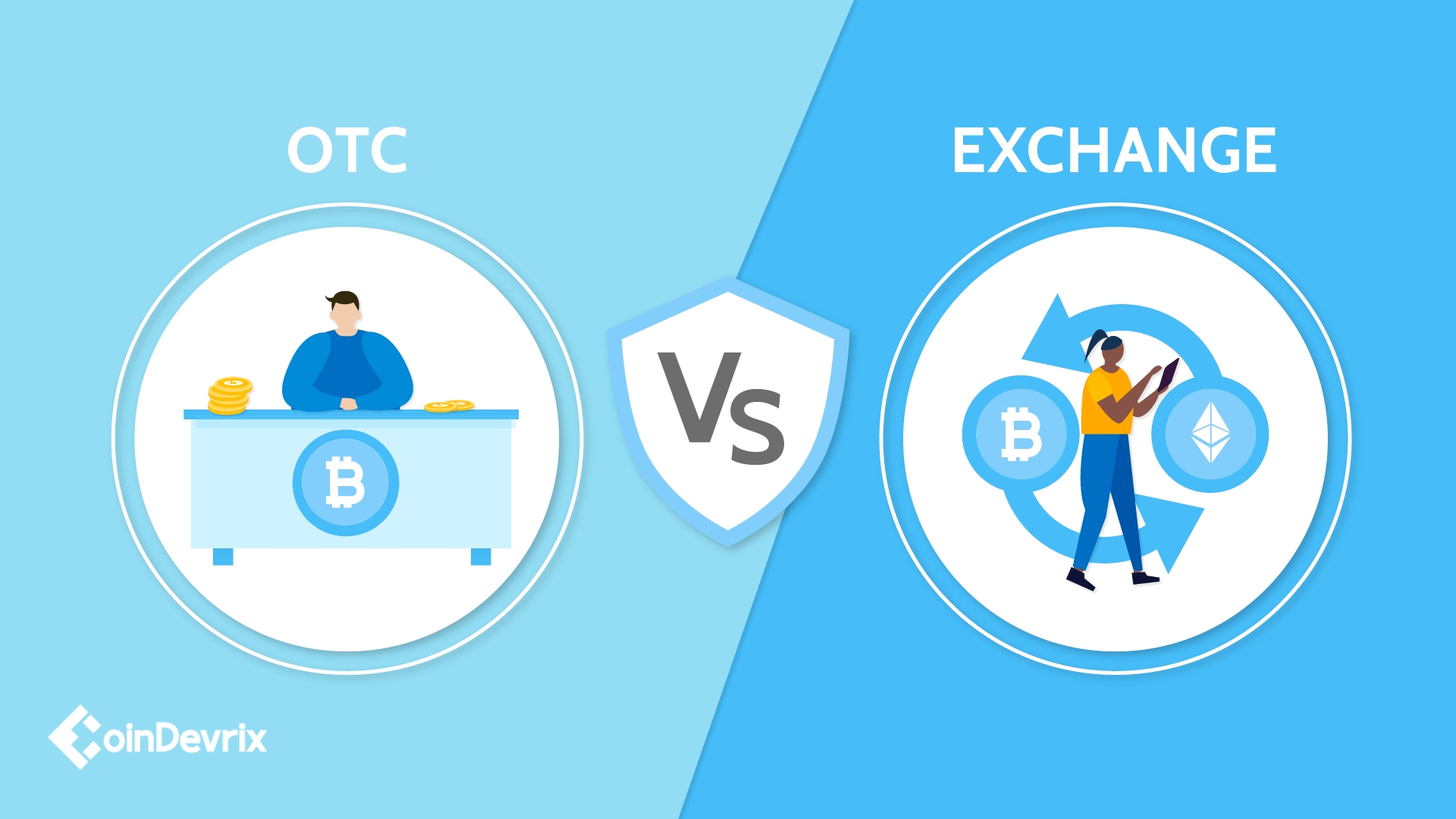OTC Crypto Trading—How Does it Work? Cryptocurrency trading that does not use centralized exchanges is called over-the-counter (OTC) crypto trading. Instead of trading on centralized platforms, over-the-counter (OTC) crypto brokerage firms act as intermediaries to facilitate cryptocurrency trading. Since buyers and sellers engage in direct transactions without utilizing order books in over-the-counter trading, it provides a more private environment than public exchanges. The increased liquidity of over-the-counter markets allows for massive trades to occur with little to no price slippage. Compared to traditional exchanges, OTC cryptocurrency deal resolution is usually faster and more adaptive, considering the multiple settlement choices counterparties need.
However, there are dangers associated with over-the-counter bitcoin trading. One such risk is counterparty risk, which refers to the chance that one party may not fulfil their end of a deal and end up losing money. Negotiated terms, seller reputation, and market demand are reasons over-the-counter transaction prices could differ from publicly displayed pricing.
How Crypto OTC Trading Works
Cryptocurrency OTC trading opposes traditional exchanges, favoring direct transactions between buyers and sellers. The broker’s role is to mediate between the buyer and seller based on the specifics of the transaction, such as the amount and the cryptocurrency’s price. Before commencing a deal, the parties negotiate terms, including the asset’s price, the method of settlement, and the duration. The lack of entry into public order books makes over-the-counter transactions less transparent than exchange trades. When parties reach an agreement, the broker will see the transaction and settlement process go smoothly. Bank transfers, escrow services, and face-to-face meetings are some of the methods that can be utilized to settle deals.
The ability to handle large transactions without impacting market pricing makes over-the-counter trading appealing to institutional investors and high-net-worth individuals. It is essential to conduct thorough due diligence before engaging in over-the-counter transactions since. However, these transactions may provide advantages like anonymity and adaptability, but they also include dangers such as price volatility and counterparty default.
Crypto OTC Trading Strategies
A wide range of methods is available to investors who want to trade cryptocurrencies over-the-counter (OTC). Market makers, who are traders, often offer to buy or sell assets at quoted prices to provide liquidity. By providing liquidity, these traders aim to profit from the bid-ask spread, which is the difference between the prices on the OTC and exchange markets.
Arbitrage is another strategy that can be used to one’s advantage by capitalizing on price discrepancies across various open exchanges and OTC platforms. Arbitrageurs buy assets on one platform at a discount and resell them on another at a premium to capitalize on price inefficiencies. In addition, some traders use algorithmic trading to automate OTC deals, which allows for quick execution and risk control. Additionally, OTC traders employ risk management tactics such as hedging and portfolio diversification to mitigate market volatility. For instance, traders can diversify their portfolios among cryptocurrencies and utilize derivatives contracts to spread risk or insure against adverse price movements.
Strategic timing, which involves monitoring market patterns and news events, is also essential for traders. This lets them decide the best times to enter and exit the market. Whether taking advantage of short-term price dislocations or secretly completing large block trades, successful over-the-counter traders have a firm grasp of market dynamics, a system for managing risk, and the agility to adapt to changing market conditions.
OTC vs. Exchange-based Crypto Trading

Exchanges and over-the-counter (OTC) trading are the main venues for exchanging cryptocurrencies. Because of the secrecy and flexibility it provides through direct transactions between parties, institutional investors often utilize over-the counter trading for huge trades. But, exchange-based trading is more transparent but less private because it occurs on open platforms with order books. While exchange-based trading offers immediate execution at current market rates, over-the-counter transaction prices could differ from exchange rates because of negotiation. The two methods meet different needs and preferences in the cryptocurrency market.
Benefits of OTC Crypto Trading
As an alternative to traditional exchanges, over-the-counter (OTC) cryptocurrency trading provides market participants privacy, liquidity, and flexibility. The anonymity of over-the-counter (OTC) transactions is superior to that of exchange-based trading since they occur directly between parties rather than being recorded in public order books. This anonymity is desirable to institutional investors and high-net-worth individuals because they place importance on maintaining transaction secrecy.
Also, there is less price slippage when dealing with over-the-counter marketplaces because they tend to possess more liquid. This liquidity directly results from OTC brokers’ proficiency in connecting buyers and sellers, even for substantial transaction sizes. In contrast to more conventional exchanges, the lack of transparency in over-the-counter markets increases the likelihood of price manipulation and other forms of fraud. Furthermore, participants in an over-the-counter trade have greater leeway to tailor settlement terms and procedures to their own needs, which increases the flexibility of trade resolution. However, the absence of regular settlement procedures in over-the-counter trade leaves room for disputes and potential delays.
Regulatory Considerations in OTC Crypto Trading
Compliance with KYC and AML processes is vital to navigate the complexity of regulations and mitigate risks in over-the-counter cryptocurrency trading. A thorough management of regulatory considerations is essential for participants in over-the-counter cryptocurrency trading to remain compliant and mitigate risks. To prevent illicit activities, including fraud, money laundering, and the funding of terrorism, regulators worldwide are closely monitoring over-the-counter (OTC) cryptocurrency transactions as the market grows.
Consequently, there are a lot of regulatory frameworks that people who trade cryptocurrencies over the counter must follow, including KYC and AML requirements. Monitoring transactions, collecting and verifying client data, and reporting suspicious conduct to the proper authorities are everyday tasks that arise from these obligations.
Over-the-counter (OTC) trading platforms require even more stringent regulatory compliance because numerous authorities may require these platforms to operate legitimately. Adherence to regulatory norms by participants in the over-the-counter crypto trading environment can foster legitimacy, trust, and transparency. This will bolster the industry’s long-term growth and sustainability.









